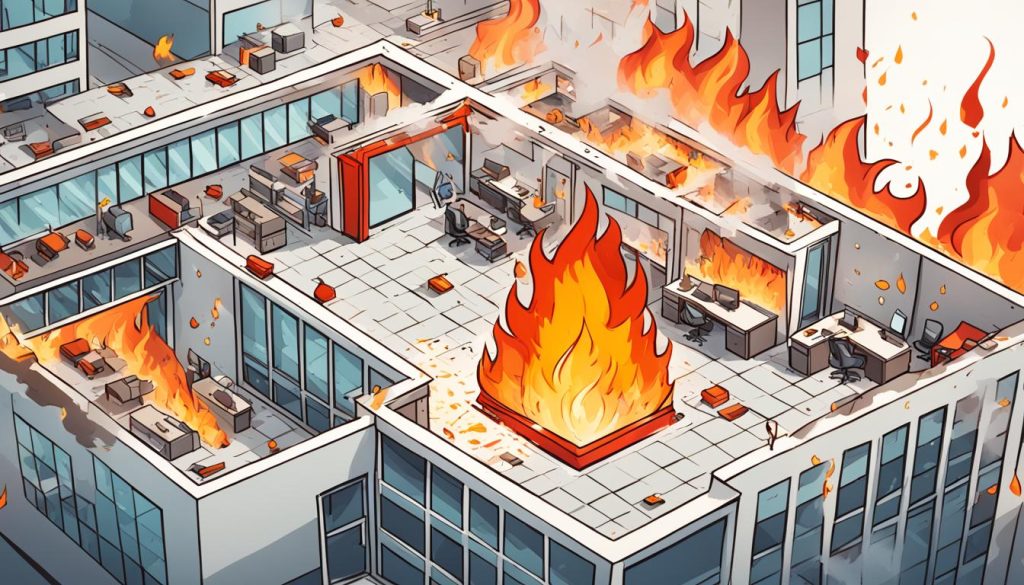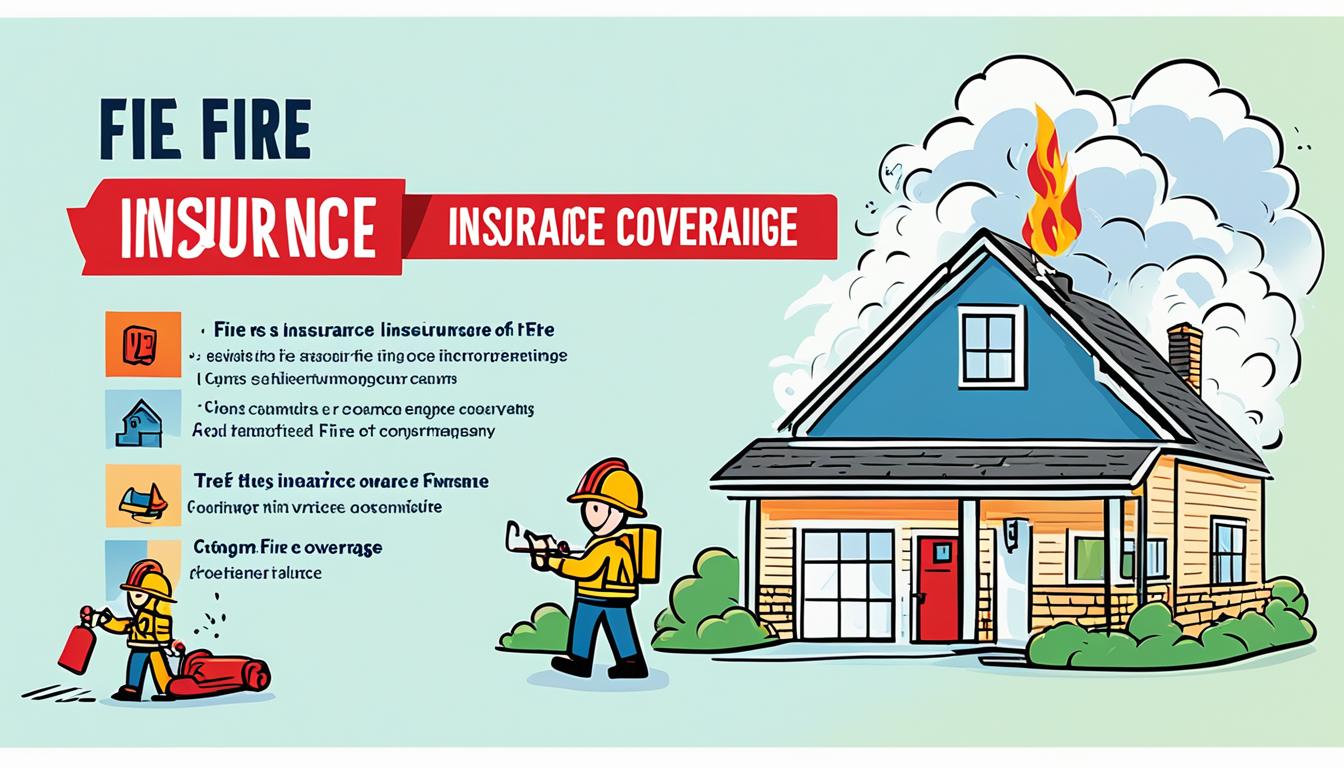When it comes to running a business, protecting your venture is crucial. Losses due to fire incidents can be devastating, both financially and emotionally. That’s why having fire insurance for businesses is of utmost importance. Whether you own a small enterprise or a large corporation, having the right insurance coverage can provide peace of mind and financial security in the event of fire-related damages.
Fire insurance for businesses encompasses various types of coverage, such as commercial property insurance, business interruption coverage, and liability insurance. Commercial property insurance protects the physical structure of your business, ensuring that any fire damage is covered. Business interruption coverage compensates for the income lost during the downtime caused by a fire. Liability insurance protects your business from potential claims related to fire damage, ensuring that you have adequate protection if legal actions are taken against your venture.
For small business owners, having proper fire insurance coverage is even more critical, as they often have limited resources and may struggle to recover from significant losses. Therefore, it is essential to find an insurance policy that suits your specific needs and provides comprehensive coverage for your business.
Key Takeaways:
- Fire insurance for businesses is essential to protect your venture from fire-related losses.
- Types of coverage include commercial property insurance, business interruption coverage, and liability insurance.
- Small business owners should prioritize finding comprehensive fire insurance coverage.
- Fire insurance provides financial security and peace of mind in the event of fire-related damages.
- Choose an insurance policy that suits your specific business needs and offers adequate protection.
Understanding Fire Insurance Coverage for Businesses
When it comes to protecting your business from the devastating effects of a fire, having comprehensive fire insurance coverage is crucial. Understanding what fire insurance covers and how it can mitigate the financial impact of fire damage is essential for every business owner. Additionally, implementing effective risk management strategies can help reduce the likelihood of fires in the first place.
Fire insurance for businesses offers coverage for various aspects related to fire damage. It typically includes coverage for property damage to your business premises, including the physical structure, equipment, and inventory. In the unfortunate event of a fire, this coverage can provide much-needed financial support to repair and replace damaged property.
Moreover, fire insurance coverage may also extend to business interruption costs. This means that if a fire renders your business temporarily unable to operate, fire insurance can help compensate for the loss of income during the downtime. This coverage can be a lifeline for businesses that heavily rely on their operations to generate revenue.
Risk management plays a vital role in preventing fires and minimizing potential damages. By implementing robust risk management strategies, businesses can identify potential fire hazards, establish fire safety protocols, and ensure proper maintenance of fire prevention systems such as fire alarms and sprinkler systems. Effective risk management not only reduces the risk of fires but also demonstrates a commitment to the safety and well-being of employees and customers.
Implementing fire prevention and risk management measures is an investment in the longevity and success of your business. By proactively addressing fire hazards, you significantly reduce the likelihood of fires and subsequent damage. Moreover, having the right fire insurance coverage provides a safety net, ensuring that your business can recover and continue operations even in the face of fire-related challenges.
Taking a proactive approach to fire insurance and risk management solidifies your business’s ability to withstand potential fire-related incidents. By understanding fire insurance coverage, implementing risk management strategies, and prioritizing the safety of your business, you can safeguard your venture against unthinkable losses.
Types of Fire Insurance Policies for Businesses
When it comes to protecting your business from fire-related risks, there are several types of fire insurance policies to consider. Understanding these options is crucial for small business owners to ensure comprehensive coverage and financial security.
Commercial Property Insurance
Commercial property insurance is a foundational component of fire insurance policies for businesses. This type of insurance provides coverage for damage to the physical structure of your business property, including the building itself, fixtures, furnishings, and inventory. In the event of a fire, commercial property insurance helps you recover the costs associated with repairing or rebuilding your business premises.
Business Interruption Coverage
Business interruption coverage is another important aspect of fire insurance policies for businesses. This coverage is designed to compensate for lost income and additional expenses that may arise when your business operations are disrupted due to fire damage. It provides financial support to help cover ongoing expenses, such as rent, utilities, and employee wages, during the downtime caused by the fire.
Liability Insurance for Businesses
Liability insurance is a crucial component of fire insurance policies, as it protects businesses from claims related to fire damage. In the unfortunate event that a fire at your business causes harm or damage to third parties, liability insurance provides coverage for legal expenses, medical costs, property damage, and more. It helps safeguard your business from potential lawsuits and financial liabilities that may arise as a result of a fire.
By combining these different types of fire insurance coverage, businesses can ensure comprehensive protection against fire-related risks. It is essential for small business owners to assess their specific needs and consult with insurance professionals to determine the most appropriate coverage options for their ventures.
| Type of Fire Insurance Policies | Key Coverage |
|---|---|
| Commercial Property Insurance | Coverage for damage to the physical structure, fixtures, furnishings, and inventory of the business property |
| Business Interruption Coverage | Compensation for lost income and additional expenses during the downtime caused by fire damage |
| Liability Insurance for Businesses | Protection from claims related to fire damage, including legal expenses, medical costs, and property damage |
Selecting the Right Fire Insurance Coverage for Your Business
When it comes to protecting your business against the devastating effects of a fire, having the right insurance coverage is essential. However, with so many options available, choosing the most suitable fire insurance policy can be a complex task. To help you navigate this process, here are some valuable tips:
Obtain Multiple Business Insurance Quotes
Obtaining multiple business insurance quotes is crucial when selecting fire insurance coverage for your business. By comparing quotes from different insurance providers, you can ensure that you are getting the best coverage at the most competitive rates. Make sure to carefully review each quote and consider factors such as coverage limits, deductibles, and any additional services offered.
Consider Risk Management Strategies
When determining the adequate level of fire insurance coverage for your business, it’s essential to consider risk management strategies. Risk management involves identifying potential hazards, implementing preventive measures, and having contingency plans in place. By assessing your business’s specific risks and vulnerabilities, you can tailor your fire insurance coverage to address these specific needs. This proactive approach helps minimize the likelihood of fire-related incidents and reduces the potential impact on your business.
Address the Needs of Business Owners
Every business is unique, and the insurance coverage you choose should reflect the specific needs of business owners. Consider factors such as the size of your business, type of industry, and the value of your assets. Additionally, take into account any legal requirements or industry-specific regulations that may apply to your business. By understanding and addressing these factors, you can ensure that your fire insurance coverage provides adequate protection and peace of mind.
When it comes to protecting your business from fire-related losses, selecting the right insurance coverage is key. By obtaining multiple business insurance quotes, considering risk management strategies, and addressing the needs of business owners, you can make an informed decision that safeguards your venture.
Understanding the Claims Process for Fire Insurance
When it comes to fire insurance for businesses, understanding the claims process is crucial. In the unfortunate event of a fire incident, knowing how to navigate the claims process can help business owners recover and rebuild.
Whether you have commercial property insurance, business interruption coverage, or liability insurance for your business, filing a claim requires certain documentation and specific steps. By following these guidelines, you can ensure a smoother and more efficient process in securing the necessary compensation.
When filing a claim for commercial property insurance, you will need to provide documentation such as the fire incident report, evidence of property ownership, and any relevant financial records supporting the value of the damaged property.
For business interruption coverage claims, you will need to document the loss of income caused by the fire and provide financial statements to substantiate the extent of the impact. Demonstrating a clear correlation between the fire incident and the financial losses is crucial in securing a successful claim.
Liability insurance claims, on the other hand, require evidence that the fire was a result of a covered liability event. This may include documentation of negligence, faulty products, or other circumstances that led to the fire. Providing detailed documentation and supporting evidence is essential in maximizing the chances of a successful claim.
Throughout the claims process, it is important to communicate and cooperate with your insurance provider. Keep a record of all interactions and promptly provide any additional information or documentation they request.
“Submitting an accurate and comprehensive claim is key to navigating the fire insurance claims process smoothly,” says Sarah Thompson, an insurance claims expert at Covington Insurance. “By ensuring you have all the necessary documentation and following the required steps, you can increase your chances of a successful claim settlement.”
Helpful Tips for a Successful Fire Insurance Claim:
- Gather all relevant documentation, including fire incident reports, financial records, and ownership documents.
- Take photographs or videos of the damage as supporting evidence for your claim.
- Communicate promptly and cooperate with your insurance provider, providing any additional information they request.
- Maintain a record of all interactions and correspondences with your insurance company.
- Consult with a professional claims adjuster or public adjuster to ensure you are receiving the appropriate compensation.
Having a comprehensive understanding of the claims process for fire insurance is vital for business owners. By navigating the process efficiently and providing the necessary documentation, you can increase the likelihood of a successful claim settlement. Remember to communicate with your insurance provider and seek professional assistance, if needed, to ensure you receive the compensation you deserve.
| Types of Coverage | Required Documentation | Key Steps |
|---|---|---|
| Commercial Property Insurance | Fire incident report, ownership documents, financial records | Notify insurance provider, document damages, submit claim with supporting evidence |
| Business Interruption Coverage | Financial statements, evidence of lost income | Document impact on business, provide financial records, demonstrate correlation between fire incident and financial losses |
| Liability Insurance | Evidence of covered liability event | Document negligence or liability, provide relevant documentation, demonstrate liability connection to the fire |
Understanding the claims process and being prepared can make all the difference for businesses seeking fire insurance coverage. By gathering the necessary documentation, following the required steps, and seeking professional guidance, business owners can navigate the claims process successfully and recover from fire-related losses.
Importance of Regularly Reviewing and Updating Fire Insurance Policies
Regularly reviewing and updating fire insurance policies is crucial for businesses to ensure they have adequate coverage and protection. As the needs of businesses evolve over time, it is essential to reassess insurance policies to align with these changes. Additionally, factors such as changes in property values and coverage requirements necessitate regular policy updates to maintain comprehensive protection. By staying proactive and diligent in reviewing and updating fire insurance policies, business owners can safeguard their ventures against potential fire-related losses.
One significant reason for regularly reviewing fire insurance policies is the evolving nature of business needs. As businesses grow and expand, their assets and liabilities change. This growth may involve acquiring new properties, equipment, or inventory, which should be accurately reflected in the insurance policy to ensure adequate coverage in the event of a fire. By regularly reviewing the fire insurance policy, business owners can identify any gaps in coverage and make the necessary adjustments to protect their assets.
Another important consideration for policy review is changes in property values. Property values may fluctuate due to various factors such as market conditions, renovations, or upgrades. It is essential to ensure that the insurance policy reflects the current value of the business property to avoid being underinsured or overinsured. Regularly assessing the property value and updating the insurance policy accordingly helps business owners maintain accurate coverage and avoid potential financial losses.
Furthermore, staying up-to-date with coverage requirements is crucial in fire insurance policies. Insurance regulations and requirements can change over time, and failure to comply with these changes may result in coverage gaps or even policy cancellations. By regularly reviewing and updating fire insurance policies, business owners can ensure that they meet the necessary coverage requirements and maintain uninterrupted protection. This proactive approach not only minimizes financial risks but also demonstrates a commitment to responsible risk management.
In conclusion, regularly reviewing and updating fire insurance policies is vital for businesses to adapt to evolving needs, changes in property values, and coverage requirements. With the potential for significant financial losses in the event of a fire, business owners must prioritize staying proactive and diligent in reassessing their insurance policies. By making necessary adjustments, business owners can confidently protect their ventures and maintain peace of mind knowing they have comprehensive fire insurance coverage.

Conclusion
In conclusion, fire insurance for businesses is a vital aspect of protecting your venture against potential fire-related losses. It is essential for business owners to obtain comprehensive coverage, including commercial property insurance, business interruption coverage, and liability insurance. By doing so, they can mitigate the financial impact of fire damage and ensure the continuity of their operations.
Additionally, implementing effective risk management strategies is crucial in reducing the likelihood of fires and minimizing their potential impact. Regularly reviewing and updating fire insurance policies allows businesses to stay current with coverage requirements and adapt to the evolving needs of their ventures.
By prioritizing fire insurance and risk management, business owners can safeguard their ventures and secure the peace of mind that comes with knowing they have adequate coverage. Whether it’s a small business or a larger enterprise, protecting your investment and assets is essential for long-term success. Make fire insurance a priority today and minimize the potential impact of fire-related incidents on your business.


